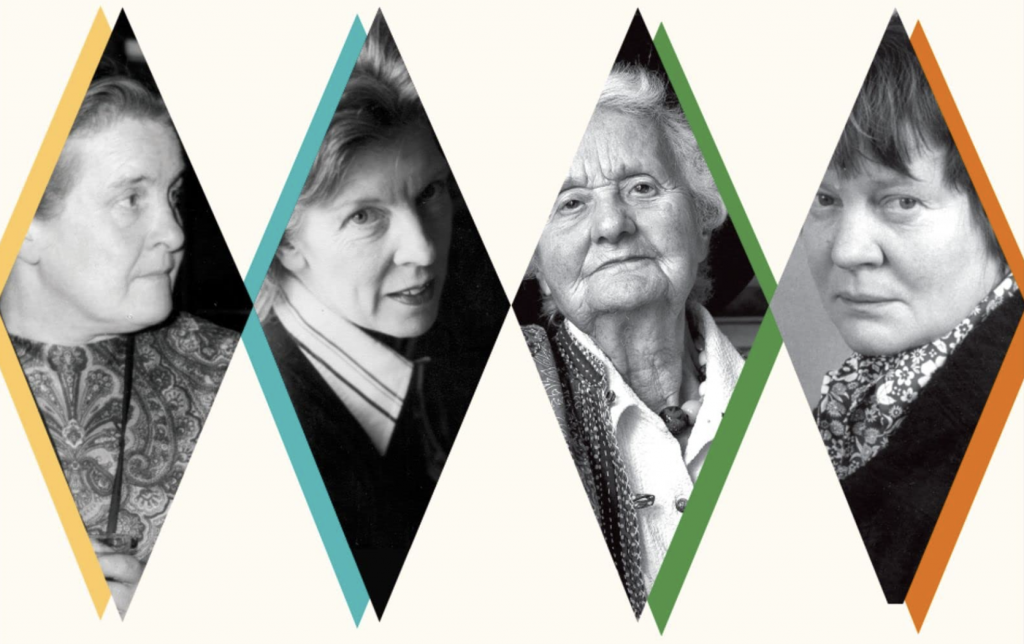I have just finished a marvelous book called The Women Are Up to Something. Written by Benjamin Lipscomb, it weaves together the biographies of four extraordinary women who arrived together as students at Oxford in the late 1930s and who flourished as scholars and writers in the mid to late twentieth century. Iris Murdoch, Mary Midgley, Philippa Foot, and Elizabeth Anscombe effected a revolution in the way in which we think about moral philosophy, and their very positive influence is much needed in the ethical conversation today.
The best known of the four are certainly Murdoch, who wrote prolifically as both a philosopher and a novelist, and Anscombe, who emerged as the translator and privileged interpreter of the work of Ludwig Wittgenstein, and who was, by all accounts, a first class character. A Catholic convert as a very young lady, Anscombe stood athwart British convention in many ways, including her brusque, direct manner of speaking and her unusual manner of dress. She was known to wear shirts and trousers, when this was basically unheard of for women, and to puff vigorously on a cigar while attending meetings. Consistently in line with Catholic teaching, she opposed birth control and abortion (thus angering the left), and she spoke out against giving President Harry Truman an honorary Oxford doctorate, since Truman had authorized the direct killing of the innocent at Hiroshima and Nagasaki (thus angering the right). In her later years, Iris Murdoch developed Alzheimer’s disease and gradually withdrew from public life. Her agonizing descent into complete dementia was chronicled in her husband’s lovely book An Elegy for Iris, which was later turned into a film starring Dame Judi Dench as the philosopher.
Now what makes these four women so interesting is not just the details of their respective biographies but the content of their thinking, especially in the arena of morals. To understand their contribution, a little background is needed. The dominant philosophical figure at Oxford when the four ladies arrived was A.J. Ayer, the founder of the movement called logical positivism. This point of view, which beguiled the minds of some of the brightest twentieth-century thinkers, was that the only statements that can be called “meaningful” are those that can be verified through empirical analysis. Thus, I can meaningfully hold that there are, say, ten people in a given room, since I can empirically confirm whether that statement is true or false. On the other hand, I speak meaninglessly when I say something like “God exists” or “You shouldn’t do that” or “That picture is beautiful.” Because none of those claims can be verified or falsified through the senses, they are, at best, expressive of the speaker’s personal preference or emotional state. Thus, on logical positivist grounds, any ethical claim is ruled out of court. When I say “Murder is wrong” or “Caring for the poor is right,” I am not asserting a truth that should have purchase with anyone else; I am simply expressing how I feel. Jean-Paul Sartre, under whose thrall the young Murdoch fell for a time, refined this a bit, saying that though there is nothing objectively true about moral claims, a human being should try to be consistent with the convictions that he has adopted for himself.
This consensus commenced to fall apart in the minds of our four women, not so much through argument at first, but through photographs. Not long after the Second World War ended, pictures from the Nazi death camps began to appear on British theatre screens. No one had ever seen anything like them before. Murdoch, Anscombe, Foot, and Midgley, each in her distinctive way, realized that what was on display in those films and photographs was wrong. Period. They didn’t entertain this as a private opinion; they weren’t just expressing their feelings. They were making the true claim that what the Nazis did in Auschwitz and Bergen-Belsen was morally abhorrent, and they realized they didn’t care that A.J. Ayer thought they were babbling meaninglessly.
In fact, they became convinced that the logical positivists and the existentialists were badly misguided in regard to ethics, and they began to look to older sources of moral thinking, especially to Thomas Aquinas, to Plato, and to Aristotle. What they found in those worthies was a keen sense of an objectively describable human nature and of those distinctive activities and moves that contribute to the flourishing of that nature. “Virtues” were the habits inclining one to objectively good behavior, and “vices” were habits inclining in the opposite direction. Hence, the women concluded, morals should not be subjectivized but objectivized, brought onto line with practices that conduced to the well-being of a human nature that can be authentically known. An entire school of ethical thinking emerged from these figures, one that came to be called “virtue ethics.” Some of its greatest adherents are Alasdair MacIntyre, Stanley Hauerwas, Charles Taylor, and Martha Nussbaum.
Does anyone doubt that an ethical subjectivism is running rampant today? Does anyone doubt that the very notion of objective moral good or moral evil is typically ruled out of court as presumptuous or expressive of someone’s desire for power? And does anyone therefore doubt that there are many people adrift in a postmodern sea of relativism and indifferentism? Might I suggest, as a sort of intellectual tonic, to dip into The Women Are Up to Something. I think you’ll find Mary Midgley, Philippa Foot, Elizabeth Anscombe, and Iris Murdoch fairly bracing company.

